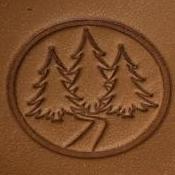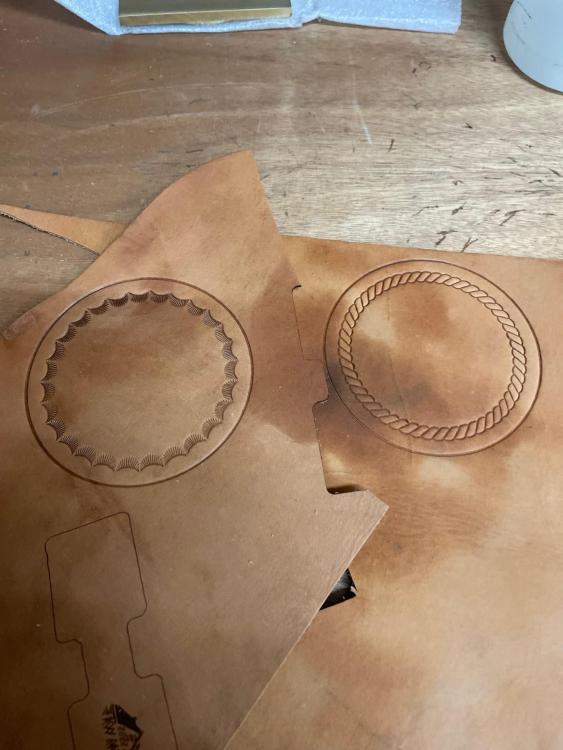-
Posts
331 -
Joined
-
Last visited
About Double Daddy
- Birthday 09/09/1976
Profile Information
-
Gender
Male
-
Location
N.E. Georgia
-
Interests
American political and social history, homesteading skills, technical crafts and trades, family genealogy.
LW Info
-
Leatherwork Specialty
Gunleather & accessories
-
Interested in learning about
Holster/Sheath related leatherwork
-
How did you find leatherworker.net?
Google search
Recent Profile Visitors
11,399 profile views
Double Daddy's Achievements

Member (2/4)
-
Just to add to Dwight's excellent advice: I use Weldwood "Red Can" Original contact cement because it's widely available at nearly every BIG BOX store, hardware or paint supply in my neck-of-the-woods. It's been my go-to adhesive for cabinetry, countertops, etc for 30yrs now...and following the directions on the can (purt'near identical to what Dwight described above), you will get excellent results. Just get it where you want it the FIRST TIME...because there is very limited adjustment once those two surfaces are joined together. That's really what contact cement is for: bonding things you want JOINED...as in, "let no man tear asunder," if correct procedure is followed. I use the very same metal handle "acid" brushes from Harbor Freight...with a 36pk only costing $3, I just use 'em & toss 'em...trying to clean cement outta one usually isn't worth the trouble. The bristles are stiff enough to allow control over where the cement is placed on your leather pieces. Chip brushes are also an option for larger areas that need gluing...HF's in my area also has those in bulk 36pack. Don Gonzales even did a video on the stuff a few weeks back, comparing it with other options...he uses GALLONS of it every year in his TX saddlery shop. Good luck...and I even like burnt bacon!
-
I bought my CB3200 new from Cowboy Bob (Toledo Sewing Machine) back in late 2013 (great folks to deal with...VERY knowledgeable)...absolutely zero regrets as far as function and easy of use. If anything and I could do over, I would have gotten the "big brother" 4500 but that's another machine for another day, i reckon...if I can spare the room (I also have an antique industrial I use for light leather, canvas and cloth). That said, if you've found a good deal on a 3200 in decent working condition...close by your abode (yay, no shipping costs!!!)...I'd jump on that train car. As the experts herein will tell you (paging Wiz and Mr. Bob especially), it and its larger contemporaries have plenty of feet/accessory options and will sew a broad range of thread sizes, albeit with some setup required. Toledo Sewing Machine has the spec's on it...Google them. (for some reason my computer won't let me link it) Hope this helps! Chris
-

How is this stitching possible on a stitcher?
Double Daddy replied to yober's topic in Sewing Leather
The Union Lockstitch machine is also a needle-awl machine...been trying to get my hands on one of those in my locale for a while. No crazy big hurry...but...they sure lay a purdy stitch line. In the meantime, I'll chug along just fine with my CB3200... Same goes for whatever old model Landis machine Sam Andrews uses for his fine leather products...check out his excellent instructional videos on YouTube. I believe he even found one of those antiques to keep around for backup purposes. -

Decent "Cheap" Servos?
Double Daddy replied to Cumberland Highpower's topic in Leather Sewing Machines
Dwight's right...experience is your best route. Talk with Bob at Toledo Sewing Machine. Aside from purchasing my CB3200 from him, he hooked me up with a servo motor for a 1940 manufactured Singer 31-15 a few years back...along with a few other parts & pieces I needed to get'er running good for canvas/cloth/etc. Plus, Bob's a frequent contributor to these forums with his extensive expertise. Call 'em up on the phone...there'll be no regrets. -
I purchased this one a year or so ago...from this link. After putting it in the online cart and checking out, the owner called me the next day to say they didn't have it in stock but would ship it as soon as more were available (a week or so, IMS). He even threw in an extra cutting pad for my inconvenience. I have zero complaints for the machine or my experience with the company: https://industrialsewingmachineman.com/machines/mach.asp?dir=leathercutting&brand=Cowboy&Model=8360&ProductType=Leather+cutting++Machines Hope this helps...DD
-

Dye Reducer
Double Daddy replied to Dwight's topic in Dyes, Antiques, Stains, Glues, Waxes, Finishes and Conditioners.
Denatured alcohol...I can get it locally for WAY cheaper than driving to my nearest leather supplier for Fiebings branded thinner and it does basically the same thing...some within these forums say it IS the same (I'm not a educated chemist so I can't vouch for that statement). Elsewhere I've read about others using isopropyl or even mineral spirits. Fiebing's claims their reducer is specially formulated to work consistently with their dyes. I've also read that alcohols, etc dry out leather but I've not worried much about that since I treat all of my projects during the course of construction with pure NFO. From reading your posts, I suspect you do the same...especially with those saddle tan dyed pieces... -
Thank you, Sir! The MUCH thicker sport drink bottles didn't even cross my mind. Appreciate the link as well!
-
Okay...now I'm curious. By "16 oz bottles I have saved", I'm guessing you mean regular ol' plastic water bottles (Desani, Aquafina, DeerPark, etc). The 2oz squeeze bottles can be either the red cap top variety or metal needle version? I've seen Don Gonzales' video about adhesives, etc...he punches holes in his Weldwood lid to fill his working grungy-looking glue reservoir, then uses small bits of leather to cap over the holes (secured by the contact cement itself)...easy to remove later and doesn't require taking off the lid or leak AND allows him to fill smaller containers in similar fashion to the way you are talking about here. Always looking to glean knowledge where I can...also follow your work on the FB...excellent craftsmanship, Sir! Any further info you can share is always appreciated!
-
Like the Good Rev. Dwight, I'm a devotee of Weldwood (Red Can Original). I've also used TiteBond II/III wood glue in a pinch simply because I keep it on-hand for other things in my shop...it works well too and allows for a bit of adjustability but, as Dwight mentioned, the "setup" is longer...likely due to the application differences between the two types of glue. As for keeping my Weldwood workable, I try not to let my glue pot get too low (keep it filled and well-stirred when I'm not actively working on projects) or sitting out in my work shop when it's too hot/cold (that space isn't climate controlled so some chemicals are brought inside to a space where they can be kept more stable, temperature-wise, yet isolated from human-kind).
-
Whistle - Mr. Bruce was kind enough to share some of his knowledge in a thread a couple months back...lots of helpful info therein!:
-
What Dwight said. I hoard pickle/jelly/olive jars and use them for things like glue and custom dye mixes (full strength and diluted). As for the Teflon pot, I haven't read near enough positives to persuade me to purchase one for use with the adhesive I use (Weldwood Red Can Original). Harbor Freight is also pretty hard to beat (at least I've found to be the case) when it comes to availability & price of those acid brushes...and the wooden handled "chip" brushes. Some stores also carry bulk boxes for even better per-unit pricing. I'm sure you could look within these forums and find HF is many a leatherworker's friend and go-to for various/sundry supply.
-

Resole cowboy boots
Double Daddy replied to PurpleBronc's topic in Shoes, Boots, Sandals and Moccassins
You keep posting (as your time allows)...and we'll keep reading!!! Most appreciated! -

Old round punches - yard sale finds - need some TLC
Double Daddy replied to Sprocket's topic in Sharpen it!
This is great wisdom, Mr. Bruce...thanks for sharing! I've been wondering about the best way to sharpen these kind of "handled" punches. My round punches are usually chucked into a drill press and get strips of wet/dry sand paper and/or emory cloth (working thru the grits as you suggested) to keep them fine tuned...but...the slack area on the belt sander would be great for what you are describing. Again...appreciate it! -
I went the same way Dwight did when it comes to custom stamps...brass being the preferred material because I tried HDPE/delrin and other plastics years ago and they didn't give the crisp results I was looking for, long term. I've always gotten great service from https://leatherstampmaker.com/ ...great folks who communicate well, ship quickly and offer lots of different options. We've ordered makers' marks of different sizes from them as well as a set of custom coaster embossing & cutting dies for production work. These will will emboss two different borders (camouflage or rope) and/or click out a simple coaster blank...the borders are spaced far enough in to allow for a stitch line to a backer material (cork, milled oil-tan, etc)...room in the center for monogramming. Peruse their website, give them a call/email...LSM will be glad to help you.
-

Price Comparison: Fiebing's Neatsfoot Oil
Double Daddy replied to BigDogPaul1962's topic in Suppliers
Here's the direct Amazon link to the Farnam NFO (not a compound): https://www.amazon.com/stores/page/9DE069A2-2F42-4600-9929-AF4F5CD62B8C/search?ref_=ast_bln&terms=neatsfoot oil





